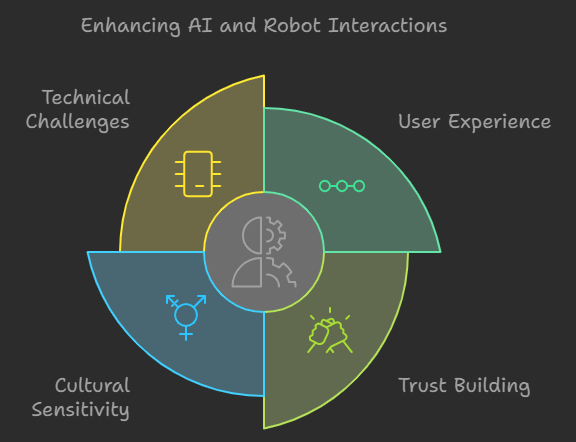Names define a great portion of our identity and are more than just labels. In robotics and artificial intelligence, recognition, processing, and appropriate application of names are absolutely vital. Imagine chatting with a personal assistant robot and she constantly mispronouncing your name. Frustrating, correct? Here is where creative solutions like WRITA find application. Focusing on WRITA—a conceptual framework meant to increase name recognition and processing in artificial intelligence—we shall explore how names are portrayed in name in a robotic form in this essay.
Understanding the Importance of Names in Robotics

Making good, user-friendly artificial intelligence and robots depends on personalizing. Calling a person by their name improves the interaction whether it is with a customer service bot or a smart home assistant like Alexa. Names enable the user experience to be more pleasant and interesting by helping to build familiarity and trust.
In robots, though, representing names is more difficult than it sounds. Each name is unique; many names include linguistic and cultural subtleties. Incorrect name could cause misunderstandings and even discontent in services. .
Challenges of Representing Names in AI and Robotics
The variety of name in a robotic form worldwide presents one of the main challenges in programming artificial intelligence to identify names. Every one of the thousands of distinct civilizations and languages has own naming practices. Certain names have several spellings, such as “Katherine” and “Cate.” Others, with distinct characters and pronunciations, could be complicated like with Chinese names.
Pronunciation is then another issue. Not the same is teaching a robot to say “Xochitl,” a Nahuatl name, accurately as teaching it to say “John.” To do things correctly, robots must grasp context, accents, even tone; this is where WRITA helps.
What is WRITA?
World-Robotic Identification and Transformation Algorithm, or WRITA for short This fictitious approach is meant to enable artificial intelligence and robotics effectively handle and depict names. From resolving spelling errors to comprehending cultural naming practices, WRITA is built to fit the complexity of name recognition.
How WRITA Represents Names
Names are broken out by WRITA into several data points. To ensure it gets names perfect, it handles each syllable, the usual spelling variations, and the cultural context. Additionally stored in this system are metadata including phonetic clues, which enable precise name pronunciation for artificial intelligence.
Assuming the name is “José,” WRITA would examine it phonetically, knowing that the emphasis above the “e” alters the pronunciation, so assuring the robot speaks “ho-ZAY” instead of “JOES.”
WRITA’s Language and Culture Flexibility
Flexibility is among WRITA’s strongest suit. It’s meant to manage names from several cultures by identifying regional name variants. Whether it’s “Ying” in China or “Ab Abdullah” in the Middle East, WRITA follows the linguistic guidelines relevant to any particular name.
The Role of AI in Understanding Names
The success of WRITEA is much influenced by artificial intelligence. Natural language processing (NLP) enables artificial intelligence to assist robots grasp name structure and sound. The artificial intelligence picks trends in names over time, so enhancing accuracy and efficiency.
WRITA vs. Traditional Methods
Many times strict, traditional name recognition algorithms only match names from pre-programmed databases. WRITA is dynamic, on the other hand. It learns and adapts, which increases dependability while handling unusual or rare names.
User Interaction with Robots Through Name Recognition
Imagine arriving at a hotel where a robot names you. WRITA offers a degree of personalizing that changes user engagement, thereby making this possible. Knowing your name will help robots to present a more natural and interesting experience.
Improving Accuracy in Name Recognition
WRITA is about properly identifying names, not only about recognizing them. WRITA is a dependable tool for companies and services depending on automated interactions since its advanced algorithms and machine learning help to lower name recognition errors.
The Ethics of Name Data in Robotics
There are privacy issues given all the data collecting involved. WRITA solves this by limiting access and encrypting name data, therefore safeguarding user personal data. Modern artificial intelligence systems give data security first concern.
Real-World Applications of WRITA
Although WRITA is a conceptual framework, there are actual similarities. Already improving in name recognition are systems like Apple’s Siri and Google’s speech recognition. WRITA, however, goes one step further with its emphasis on cultural adaptation and accuracy.
The Future of Names in Robotics
AI’s capacity to identify and process names will change along with its evolution. Robotics’ future might see much more sophisticated systems capable of not only name recognition but also nuanced understanding of them.
Conclusion
Our interactions revolve on names, hence artificial intelligence has to get them perfect. WRITA marks a progress in ensuring that artificial intelligence systems and robots are more suited to manage the complexity of human identities. In the realm of name recognition in robots, WRITA might be a game-changer for everything from personalization to pronunciation to cultural awareness.
FAQs
- How does WRITA differ from other name recognition tools?
WRITA adapts to different languages and cultures, providing more accurate name recognition. - Can WRITA handle rare or complex names?
Yes, WRITA is designed to learn and process rare or complex names using its advanced algorithms. - Is WRITA safe and secure for storing personal data?
Yes, WRITA encrypts all name data to ensure privacy and security. - How can WRITA improve customer service bots?
By accurately recognizing names, WRITA enhances personalization and makes interactions more natural.
What is the future of name recognition in AI and robotics?
The future looks promising with more adaptive systems like WRITA, which will further improve accuracy and cultural understanding.

